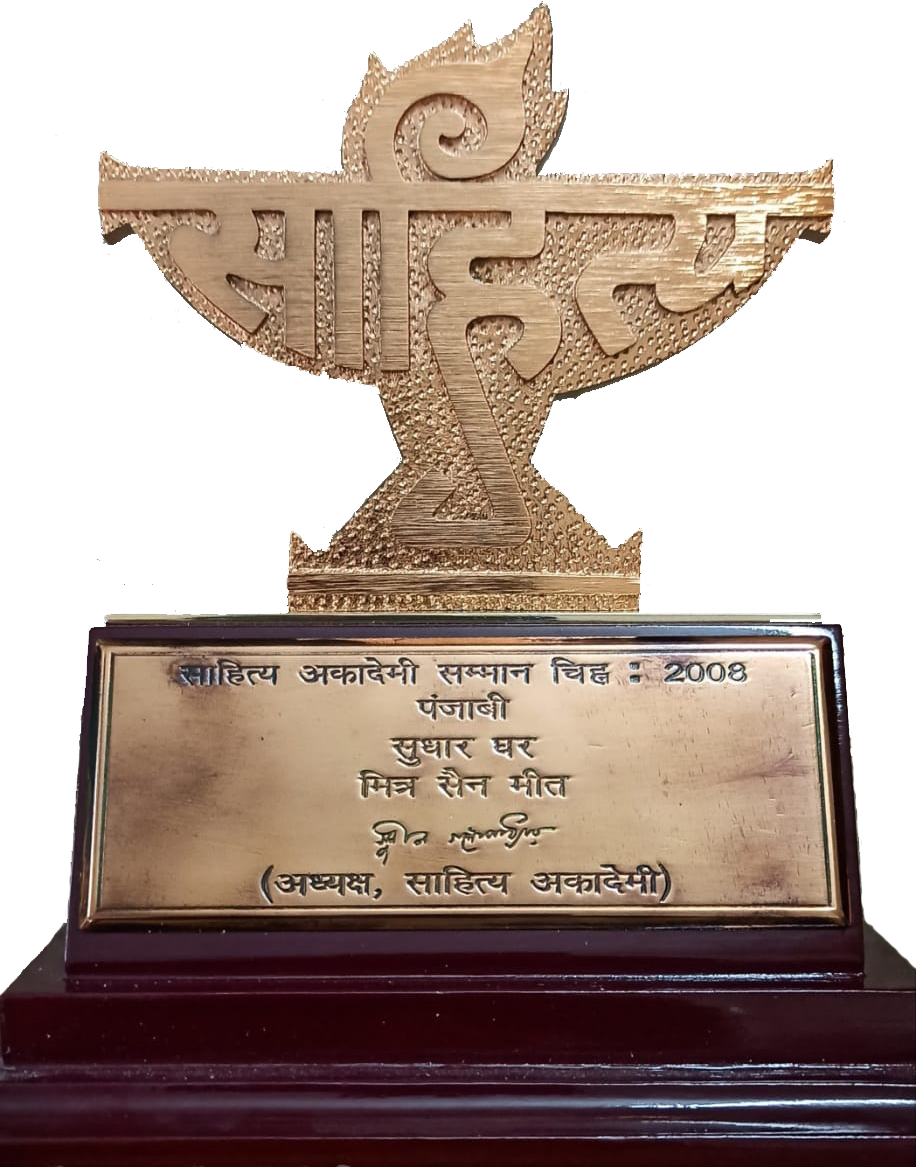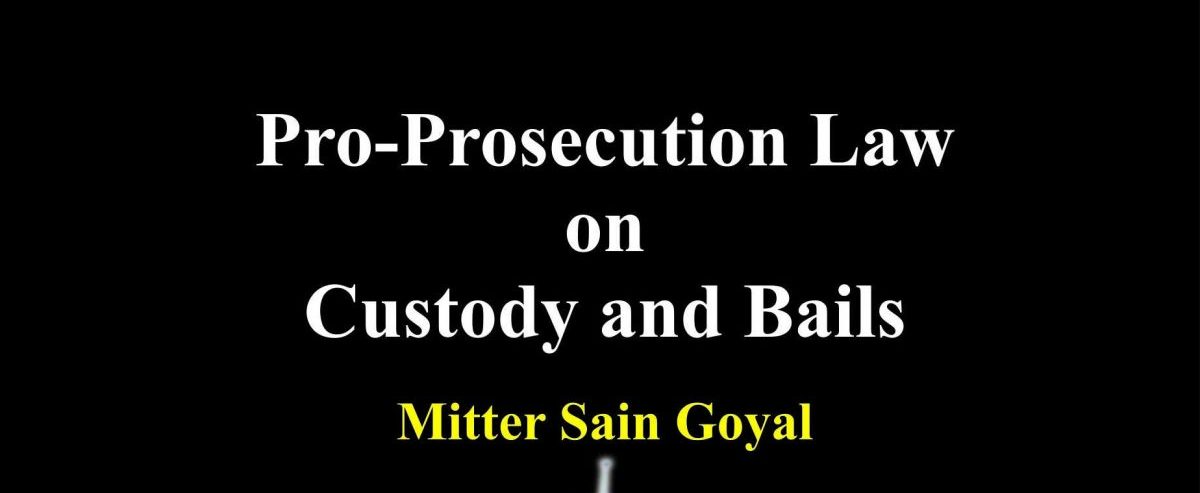ਜ਼ਮਾਨਤ ਦਾ ਖਾਰਜ ਹੋਣਾ
(Cancellation of bail : Sections 437(5) and 437(2) Cr.P.C.)
ਜ਼ਮਾਨਤ ਤੇ ਰਿਹਾਅ ਕਰਨ ਦਾ ਹੁਕਮ ਸੁਣਾਉਂਦੇ ਸਮੇਂ, ਅਦਾਲਤ ਵੱਲੋਂ ਦੋਸ਼ੀ ਤੇ ਕੁਝ ਸ਼ਰਤਾਂ ਲਾਈਆਂ ਜਾਂਦੀਆਂ ਹਨ। ਰਿਹਾਅ ਹੋਣ ਬਾਅਦ ਦੋਸ਼ੀ ਵੱਲੋਂ ਇਨ੍ਹਾਂ ਸ਼ਰਤਾਂ ਦੀ ਪਾਲਣਾ ਕਰਨੀ ਜ਼ਰੂਰੀ ਹੁੰਦੀ ਹੈ। ਇਹ ਸ਼ਰਤਾਂ ਅਕਸਰ ਹੇਠ ਲਿਖੇ ਅਨੁਸਾਰ ਹੁੰਦੀਆਂ ਹਨ:
(ੳ) ਜੇਲ ਵਿਚੋਂ ਬਾਹਰ ਆ ਕੇ ਦੋਸ਼ੀ ਹੋਰ ਜ਼ੁਰਮ ਨਹੀਂ ਕਰੇਗਾ।
(ਅ) ਮੁਕੱਦਮੇ ਦੀ ਸੁਣਵਾਈ ਦੌਰਾਨ ਲਗਾਤਾਰ ਅਦਾਲਤ ਵਿਚ ਪੇਸ਼ ਹੋਵੇਗਾ।
(ੲ) ਮੁਕੱਦਮੇ ਦੇ ਮੁਦਈ ਜਾਂ ਗਵਾਹਾਂ ਨੂੰ ਗਵਾਹੀ ਦੇਣ ਤੋਂ ਰੋਕਣ ਲਈ ਨਾ ਪ੍ਰਭਾਵਿਤ ਕਰੇਗਾ ਅਤੇ ਨਾ ਹੀ ਡਰਾਏ ਧਮਕਾਏਗਾ।
(ਸ) ਚੱਲ ਰਹੀ ਤਫਤੀਸ਼ ਵਿਚ ਰੁਕਾਵਟ ਨਹੀਂ ਪਾਵੇਗਾ। ਤਫਤੀਸ਼ੀ ਅਫਸਰ ਤੇ ਤਫਤੀਸ਼ ਠੀਕ ਢੰਗ ਨਾਲ ਨਾ ਕਰਨ ਲਈ ਦਬਾਅ ਨਹੀਂ ਪਾਵੇਗਾ।
(ਹ) ਲੋੜ ਅਨੁਸਾਰ ਹੋਰ ਸ਼ਰਤਾਂ ਵੀ ਲਗਾਈਆਂ ਜਾ ਸਕਦੀਆਂ ਹਨ। ਜਿਵੇਂ ਕਿ ਪਾਸਪੋਰਟ ਦਾ ਅਦਾਲਤ ਵਿਚ ਜਮਾਂ ਕਰਨਾ, ਵਿਦੇਸ਼ ਜਾਣ ਤੋਂ ਪਹਿਲਾਂ ਅਦਾਲਤ ਤੋਂ ਮੰਨਜ਼ੂਰੀ ਲੈਣਾ ਆਦਿ।
ਜੇਲੋਂ ਬਾਹਰ ਆ ਕੇ ਜੇ ਦੋਸ਼ੀ ਇਨ੍ਹਾਂ ਸ਼ਰਤਾਂ ਦੀ ਉਲੰਘਣਾ ਕਰਦਾ ਹੈ ਤਾਂ ਦੋਸ਼ੀ ਦੀ ਜ਼ਮਾਨਤ ਦਾ ਹੁਕਮ ਰੱਦ ਕਰਕੇ ਉਸਨੂੰ ਮੁੜ ਜੇਲ ਵਿਚ ਭੇਜਿਆ ਜਾ ਸਕਦਾ ਹੈ।
ਇੱਕ ਗੱਲ ਸਮਝ ਲੈਣੀ ਜ਼ਰੂਰੀ ਹੈ ਕਿ ਜ਼ਮਾਨਤ ਰੱਦ ਕਰਨ ਦਾ ਹੁਕਮ ਕੇਵਲ ਉਹੋ ਅਦਾਲਤ ਸੁਣਾ ਸਕਦੀ ਹੈ ਜਿਸ ਵੱਲੋਂ ਜ਼ਮਾਨਤ ਮੰਨਜ਼ੂਰ ਕਰਨ ਦਾ ਹੁਕਮ ਸੁਣਾਇਆ ਗਿਆ ਹੋਵੇ। ਉਦਾਹਰਣ ਲਈ ਜੇ ਹੁਕਮ ਹਾਈ ਕੋਰਟ ਵੱਲੋਂ ਸੁਣਾਇਆ ਗਿਆ ਹੈ ਤਾਂ ਜ਼ਮਾਨਤ ਦਾ ਹੁਕਮ ਕੇਵਲ ਹਾਈ ਕੋਰਟ ਹੀ ਰੱਦ ਕਰ ਸਕਦੀ ਹੈ। ਮੈਜਿਸਟ੍ਰੇਟ ਜਾਂ ਸੈਸ਼ਨ ਜੱਜ ਨਹੀਂ।
ਜ਼ਮਾਨਤ ਖਾਰਜ ਕਰਨ ਦਾ ਉਦੇਸ਼ (Object of cancellation of bail):
ਗ੍ਰਿਫਤਾਰੀ ਤੋਂ ਬਾਅਦ ਹੋਈ ਜ਼ਮਾਨਤ ਨੂੰ ਰੱਦ ਕਰਨ ਦਾ ਉਦੇਸ਼ ਮੁਕੱਦਮੇ ਦੀ ਨਿਰਪੱਖ ਸੁਣਵਾਈ ਅਤੇ ਇਨਸਾਫ ਯਕੀਨੀ ਬਣਾਉਣਾ ਹੈ।
Case : Panchanan Mishra Vs.Digamber Mishra, 2005 Cr.L.J.1721, AIR 2005 SC 1299
Para “13. The object underlying the cancellation of bail is to protect the fair trial and secure justice being done to the society by preventing the accused who is set at liberty by the bail order from tampering with the evidence in heinous crime and if there is delay in such a case the underlying object of cancellation of bail practically loses all its purpose and significance to the greatest prejudice and the interest of the prosecution. It hardly requires to be stated that once a person released on bail in serious criminal cases where the punishment is quite stringent and deterrent the accused in order to get away from the clutches of the same indulge in various activities like tampering with the prosecution witnesses threatening the family members of the deceased victim and also create problems of law and order situation.”
ਅਰਜ਼ੀ ਦਾ ਅਧਿਕਾਰ ਬਾਹਰਲੇ ਵਿਅਕਤੀ ਨੂੰ ਵੀ ਉਪਲੱਬਧ ਹੈ (Right of a stranger to file the application):
ਜ਼ਮਾਨਤ ਰੱਦ ਕਰਵਾਉਣ ਦੀ ਦਰਖਾਸਤ ਮ੍ਰਿਤਕ ਦੇ ਪਿਤਾ ਵੱਲੋਂ ਵੀ ਦਾਇਰ ਕੀਤੀ ਜਾ ਸਕਦੀ ਹੈ।
Case : Puran vs. Rambilas and another, 2001 Crl.L.J. 2566 (SC)
Para “13. ….. In this case the application for cancellation of bail is not by a total stranger but it is by the father of the deceased.”
ਜ਼ਮਾਨਤ ਮੰਨਜ਼ੂਰ ਹੋਣ ਬਾਅਦ ਸਰਕਾਰ ਲਈ ਉਪਲੱਬਧ ਵਿਕਲਪ (Options available to the State after the grant of regular bail):
ਦੋਸ਼ੀ ਦੀ ਜ਼ਮਾਨਤ ਮੰਨਜ਼ੂਰ ਹੋਣ ਬਾਅਦ, ਸਰਕਾਰ ਕੋਲ ਉਪਲੱਬਧ ਵਿਕਲਪ (option):
a) ਜ਼ਮਾਨਤ ਦੇ ਹੁਕਮ ਵਿਰੁੱਧ ਅਪੀਲ: ਜੇ ਅਦਾਲਤ ਵੱਲੋਂ ਜ਼ਮਾਨਤ ਮੰਨਜ਼ੂਰ ਕਰਨ ਦਾ ਹੁਕਮ ਅਣਉਚਿਤ, ਗੈਰ-ਕਾਨੂੰਨੀ ਜਾਂ ਤੱਥਾਂ ਤੇ ਅਧਾਰਿਤ ਨਾ ਹੋਵੇ ਤਾਂ ਸਰਕਾਰ ਅਜਿਹੇ ਹੁਕਮ ਨੂੰ ਰੱਦ ਕਰਾਉਣ ਲਈ ਉੱਪਰਲੀ ਅਦਾਲਤ ਵਿੱਚ ਅਪੀਲ ਕਰ ਸਕਦੀ ਹੈ।
ਅ) ਜ਼ਮਾਨਤ ਰੱਦ ਕਰਾਉਣ ਲਈ ਅਰਜ਼ੀ: ਜੇ ਜ਼ਮਾਨਤ ਦਾ ਹੁਕਮ ਹੋਣ ਸਮੇਂ ਹੁਕਮ ਕਾਨੂੰਨ ਅਨੁਸਾਰ ਹੋਵੇ ਪ੍ਰੰਤੂ ਦੋਸ਼ੀ ਦੇ ਜ਼ਮਾਨਤ ਉੱਪਰ ਰਿਹਾ ਹੋਣ ਬਾਅਦ ਦੋਸ਼ੀ ਵੱਲੋਂ ਗਵਾਹੀ ਵਿੱਚ ਛੇੜ-ਛਾੜ ਕਰਨ ਜਾਂ ਤਫਤੀਸ਼ ਵਿੱਚ ਦਖਲ ਅੰਦਾਜ਼ੀ ਕਰਨ ਜਾਂ ਭਗੌੜਾ ਹੋਣ ਦੇ ਯਤਨ ਕੀਤੇ ਹੋਣ ਤਾਂ ਸਰਕਾਰ ਜ਼ਮਾਨਤ ਦੇ ਹੁਕਮ ਨੂੰ ਰੱਦ ਕਰਾਉਣ ਲਈ ਅਰਜ਼ੀ ਦੇ ਸਕਦੀ ਹੈ।
Case : Gurcharan Singh and others Vs. State of Delhi Administration, 1978 Cri.L.J.129(1) (SC)
Para “16. If, however, a Court of Session had admitted an accused person to bail, the State has two options. It may move the Sessions Judge if certain new circumstances have arisen which were not earlier known to the State and necessarily, therefore, to that Court. The State may as well approach the High Court being the superior Court under S.439 (2) to commit the accused to custody. When, however, the State is aggrieved by the order of the Sessions Judge granting bail and there are no new circumstances that have cropped up except those already existed, it is futile for the State to move the Sessions Judge again and it is competent in law to move the High Court for cancellation of the bail. This position follows from the subordinate position of the Court of Session vis-a-vis the High Court.”
ਜ਼ਮਾਨਤ ਨਾ ਮੰਨਜ਼ੂਰ ਅਤੇ ਖਾਰਜ ਕਰਾਉਣ ਦੇ ਵਿਕਲਪਾਂ ਵਿਚ ਭਿੰਨਤਾ (Concepts for filing appeal and for cancellation of bail are different):
ਗੈਰ-ਕਾਨੂੰਨੀ ਹੁਕਮ ਨੂੰ ਰੱਦ ਕਰਾਉਣ ਅਤੇ ਜ਼ਮਾਨਤ ਨੂੰ ਕੈਂਸਲ ਕਰਾਉਣ ਦੇ ਸੰਕਲਪ ਬਿਲਕੁਲ ਭਿੰਨ-ਭਿੰਨ ਹਨ।
Case : Puran Vs. Rambilas and another, 2001 Crl.L.J. 2566 (SC)
Para “10. Further, it is to be kept in mind that the concept of setting aside the unjustified, illegal or perverse order is totally different from the concept of cancelling the bail on the ground that accused has misconducted himself or because of some new facts requiring such cancellation.”
ਜ਼ਮਾਨਤ ਨਾ ਮੰਨਜ਼ੂਰ ਅਤੇ ਖਾਰਜ ਕਰਨ ਦੇ ਮਾਪਦੰਡਾਂ ਵਿਚ ਭਿੰਨਤਾ (Yardsticks for accepting appeal against grant of bail and for cancellation of bail are different):
ਗੈਰ-ਕਾਨੂੰਨੀ ਹੁਕਮ ਨੂੰ ਰੱਦ ਕਰਨ ਅਤੇ ਜ਼ਮਾਨਤ ਨੂੰ ਕੈਂਸਲ ਕਰਨ ਦੇ ਮਾਪਦੰਡ ਵੱਖਰੇ-ਵੱਖਰੇ ਹਨ।
Case : State through CBI Vs.Amarmani Tripathi, 2005 Crl.L.J. 4149
Para “18. In an application for cancellation, conduct subsequent to release on bail and the supervening circumstances alone are relevant. But in an appeal against grant of bail, all aspects that were relevant under Section 439 read with Section 437, continue to be relevant. We, however, agree that while considering and deciding appeals against grant of bail, where the accused has been at large for a considerable time, the post bail conduct and supervening circumstances will also have to be taken note of. But they are not the only factors to be considered as in the case of applications for cancellation of bail.”
- ਜ਼ਮਾਨਤ ਤੇ ਰਿਹਾ ਕਰਨ (for grant of bail) ਦੇ ਅਧਾਰ ਅਤੇ ਜ਼ਮਾਨਤ ਨੂੰ ਰੱਦ ਕਰਨ (for cancellation of bail) ਦੇ ਅਧਾਰ ਵੱਖਰੇ-ਵੱਖਰੇ ਹਨ।
Case (i) : Dolat Ram and others vs State of Haryana 1995 (1) SCC 349
“Rejection of bail in a non-bailable case at the initial stage and the cancellation of bail so granted, have to be considered and dealt with on different basis. Very cogent and overwhelming circumstances are necessary for an order directing the cancellation of the bail, already granted. Generally speaking, the grounds for cancellation of bail, broadly (illustrative and not exhaustive) are: interference or attempt to interfere with the due course of administration of justice or evasion or attempt to evade the due course of justice or abuse of the concession granted to the accused in any manner. The satisfaction of the court, on the basis of material placed on the record of the possibility of the accused absconding is yet another reason justifying the cancellation of bail. However, bail once granted should not be cancelled in a mechanical manner without considering whether any supervening circumstances have rendered it no longer conducive to a fair trial to allow the accused to retain his freedom by enjoying the concession of bail during the trial.”
Case (ii) State through CBI Vs.Amarmani Tripathi, 2005 Crl.L.J. 4149 (SC)
Para “18. ….. In an application for cancellation, conduct subsequent to release on bail and the supervening circumstances alone are relevant. But in an appeal against grant of bail, all aspects that were relevant under Section 439 read with Section 437, continue to be relevant. We, however, agree that while considering and deciding appeals against grant of bail, where the accused has been at large for a considerable time, the post bail conduct and supervening circumstances will also have to be taken note of. But they are not the only factors to be considered as in the case of applications for cancellation of bail.”
ਜ਼ਮਾਨਤ ਦਾ ਹੁਕਮ ਰੱਦ ਕਰਨ ਦੇ ਅਧਾਰ (Grounds of cancellation of bail)
ਦੋਸ਼ੀ ਵੱਲੋਂ ਪਹਿਲਾਂ ਕੀਤੇ ਗਏ ਜ਼ੁਰਮਾਂ ਵਰਗੇ ਹੋਰ ਜ਼ੁਰਮ ਕਰਨਾ, ਚਲ ਰਹੀ ਤਫਤੀਸ਼ ਵਿੱਚ ਦਖਲ ਅੰਦਾਜ਼ੀ, ਗਵਾਹੀ ਵਿੱਚ ਛੇੜ-ਛਾੜ ਦਾ ਕਰਨ ਦਾ ਯਤਨ, ਮੁਦਈ ਜਾਂ ਗਵਾਹਾਂ ਨੂੰ ਧਮਕੀਆਂ, ਭਗੌੜਾ ਹੋਣ ਦੇ ਯਤਨ, ਆਪਣੇ ਜ਼ਮਾਨਤੀਏ ਦੀ ਪਹੁੰਚ ਤੋਂ ਬਾਹਰ ਹੋਣ ਦਾ ਯਤਨ, ਕਿਸੇ ਬਾਹਰਲੇ ਦੇਸ਼ ਵਿੱਚ ਭੱਜ ਜਾਣ ਦੀ ਸੰਭਾਵਨਾ ਅਦਿ ਦੇ ਆਧਾਰ ਤੇ ਜ਼ਮਾਨਤ ਦਾ ਹੁਕਮ ਰੱਦ ਹੋ ਸਕਦਾ ਹੈ।
- ਜੇ ਜ਼ਮਾਨਤ ਦੇ ਹੁਕਮ ਵਿੱਚ ਗੰਭੀਰ ਕਾਨੂੰਨੀ ਤਰੁੱਟੀਆਂ (serious legal infirmity) ਹੋਣ ਤਾਂ ਹੁਕਮ ਰੱਦ ਹੋ ਸਕਦਾ ਹੈ।
Case (i) : Gurcharan Singh and others Vs. State of Delhi Administration, 1978 Cri.L.J.129(1)
Para “28. We have set out above the material portions of the order of the Sessions Judge from which it is seen that he did not take into proper account the grave apprehension of the prosecution that there was a likelihood of the appellants tampering with the prosecution witnesses. In the peculiar nature of the case revealed from the allegations and the position of the appellants in relation to the eye-witnesses it was incumbent upon the Sessions Judge to give proper weight to the serious apprehension of the prosecution with regard to tampering with the eye-witnesses, which was urged before him in resisting the application for bail.
- XXX
- XXX
- We are satisfied that the High Court has correctly appreciated the entire position and the Sessions Judge did not at the stage the case was before him. We will not, therefore, be justified under Art.136 of the Constitution in interfering with the discretion exercised by the High Court in cancelling the bail of the appellants in this case.”
- ਜੇ ਅਦਾਲਤ ਵੱਲੋਂ ਜ਼ੁਰਮ ਦੀ ਸੰਗੀਨਤਾ, ਦੋਸ਼ੀਆਂ ਵੱਲੋਂ ਗਵਾਹੀ ਵਿੱਚ ਛੇੜ-ਛਾੜ ਕਰਨ ਅਤੇ ਮੁਦਈ/ਗਵਾਹਾਂ ਨੂੰ ਧਮਕਾਉਣ ਦੀਆਂ ਸੰਭਾਵਨਾਵਾਂ ਨੂੰ ਰੱਦ ਕਰਕੇ, ਅਤਿ ਸੰਖੇਪ (non speaking) ਹੁਕਮ ਸੁਣਾਇਆ ਗਿਆ ਹੋਵੇ ਤਾਂ ਅਜਿਹਾ ਹੁਕਮ ਰੱਦ ਹੋ ਸਕਦਾ ਹੈ।
Case (i) : Panchanan Mishra Vs.Digamber Mishra, 2005 Cr.L.J.1721, AIR 2005 SC 1299 (SC)
“18. Looking into the gravity of the crime, apprehension of tampering with the evidence and threats to the life of the complainant and other witnesses given by the accused, we are of the opinion that the High Court did not take into proper account the grave apprehension of the prosecution that there was a likelihood of the accused persons tampering with the prosecution witnesses. In the peculiar nature of the case revealed from the allegations and the position of the accused in relation to the eye-witnesses it was incumbent upon the High Court to give proper weight to the serious apprehension of the complainant which was urged before him in resisting the application for bail. The High Court, in our opinion, had failed to properly appreciate the entire position. Therefore, this Court will be justified under Article 136 of the Constitution of India in interfering with the discretion exercised by the High Court in granting the bail of the accused persons…”
Case (ii) : Puran vs. Rambilas and another, 2001 Crl.L.J. 2566 (SC)
Para “9. ….. It is, however, to be noted that this Court has clarified that these instances are merely illustrative and not exhaustive. One such ground for cancellation of bail would be where ignoring material and evidence on record a perverse order granting bail is passed in a heinous crime of this nature and that too without giving any reasons. Such an order would be against principles of law. Interest of justice would also require that such a perverse order be set aside and bail be cancelled.”
- ਜ਼ਮਾਨਤ ਦਾ ਹੁਕਮ ਕੇਵਲ ਮਜ਼ਬੂਰ ਕਰਨ ਵਾਲੇ (overwhelming) ਹਾਲਾਤਾਂ ਵਿੱਚ ਹੀ ਰੱਦ ਕੀਤਾ ਜਾਣਾ ਚਾਹੀਦਾ ਹੈ।
Case (i) : Aslam Babalal Desai Vs. State of Maharashtra, 1992 Cri.L.J.3712 (SC – FB)
Para “11. Cancellation of bail is harsh order because it interferes with the liberty of the individual and hence it must not be lightly resorted to”.
Case (ii) : Ram Govind Upadhyay Vs. Sudarshan Singh and others, 2002 Crl.L.J. 1849 (1)
Para “8. Availability of overwhelming circumstances is necessary for an order as regards the cancellation of the bail order”.
Case (iii) : Dolat Ram and others vs State of Haryana 1995 (1) SCC 349 (SC)
“However, bail once granted should not be cancelled in a mechanical manner without considering whether any supervening circumstances have rendered it no longer conducive to a fair trial to allow the accused to retain his freedom by enjoying the concession of bail during the trial.”
- ਜ਼ਮਾਨਤ ਰੱਦ ਕਰਨ ਦੇ ਅਧਾਰ:
ੳ) ਜ਼ਮਾਨਤ ਤੇ ਰਿਹਾ ਹੋਣ ਬਾਅਦ ਦੋਸ਼ੀ ਦਾ ਵਿਵਹਾਰ ਅਤੇ
ਅ) ਬਾਅਦ ਦੇ ਹਾਲਾਤ
Case (i) : State through CBI Vs.Amarmani Tripathi, 2005 Crl.L.J. 4149 (SC)
Para “18. In an application for cancellation, conduct subsequent to release on bail and the supervening circumstances alone are relevant.”
Case (ii) : The State through the Delhi Administration v. Sanjay Gandhi, AIR 1978 SC 961 (SC)
“….. providing by the test of balance of probabilities that the accused has abused his liberty or that there is a reasonable apprehension that he will interfere with the course of justice is all that is necessary in order to succeed in an application for cancellation of bail.”
Case (iii) : Dolat Ram and others v. State of Haryana (1995) 1 SCC 349 (SC)
“Very cogent and overwhelming circumstances are necessary for an order directing the cancellation of the bail, already granted. Generally speaking, the grounds for cancellation of bail, broadly (illustrative and not exhaustive) are: interference or attempt to interfere with the due course of administration of justice or evasion or attempt to evade the due course of justice or abuse of the concession granted to the accused in any manner. The satisfaction of the Court, on the basis of material placed on the record of the possibility of the accused absconding is yet another reason justifying the cancellation of bail.
ਦੋਸ਼ੀ ਦੇ ਇਤਰਾਜ ਯੋਗ ਵਿਵਹਾਰ ਦੀਆਂ ਉਦਾਹਰਨਾਂ (Instances of objectionable behaviour of accused):
- ਦੋਸ਼ੀ ਦੇ ਜ਼ਮਾਨਤ ਤੇ ਰਿਹਾ ਹੋਣ ਬਾਅਦ ਦੇ ‘ਇਤਰਾਜ਼ਯੋਗ ਵਿਵਹਾਰ’ ਦੀਆਂ ਉਦਾਹਰਨਾਂ:
ੳ) ਦੋਸ਼ੀ ਵੱਲੋਂ ਪਹਿਲਾਂ ਕੀਤੇ ਗਏ ਜ਼ੁਰਮਾਂ ਵਰਗੇ ਹੋਰ ਜ਼ੁਰਮ ਕਰਨਾ
ਅ) ਚਲ ਰਹੀ ਤਫਤੀਸ਼ ਵਿੱਚ ਦਖਲ ਅੰਦਾਜ਼ੀ
ੲ) ਗਵਾਹੀ ਵਿੱਚ ਛੇੜ-ਛਾੜ ਦਾ ਕਰਨ ਦਾ ਯਤਨ
ਸ) ਮੁਦਈ ਜਾਂ ਗਵਾਹਾਂ ਨੂੰ ਧਮਕੀਆਂ
ਹ) ਭਗੌੜਾ ਹੋਣ ਦੇ ਯਤਨ
ਕ) ਆਪਣੇ ਜ਼ਮਾਨਤੀਏ ਦੀ ਪਹੁੰਚ ਤੋਂ ਬਾਹਰ ਹੋਣ ਦਾ ਯਤਨ
ਖ) ਕਿਸੇ ਬਾਹਰਲੇ ਦੇਸ਼ ਵਿੱਚ ਭੱਜ ਜਾਣ ਦੀ ਸੰਭਾਵਨਾਨੋਟ: ਮਾਣਯੋਗ ਸੁਪਰੀਮਕੋਰਟ ਵੱਲੋਂ ਅਗਾਂਹ ਇਹ ਵੀ ਸਪੱਸ਼ਟ ਕੀਤਾ ਗਿਆ ਕਿ ਉੱਪਰ ਦਰਜ ਵਿਵਹਾਰ ਕੇਵਲ ਕੁਝ ਉਦਾਹਰਨਾਂ ਹੀ ਹਨ। ਇਹਨਾਂ ਤੋਂ ਬਿਨ੍ਹਾਂ ਜ਼ਮਾਨਤ ਰੱਦ ਕਰਨ ਦੇ ਹੋਰ ਕਾਰਨ ਵੀ ਹੋ ਸਕਦੇ ਹਨ।
Case : Aslam Babalal Desai Vs. State of Maharashtra 1992 Cri.L.J.3712 (SC – FB)
Para “11. ….. As stated in Raghubir Singh’s case (AIR 1987 SC 149) the grounds for cancellation under Sections 437(5) and 439(2) are identical, namely, bail granted under Section 437(1) or (2) or 439(1) can be cancelled where (i) the accused misuses his liberty by indulging in similar criminal activity, (ii) interferes with the course of investigation (iii) attempts to tamper with evidence or witnesses, (iv) threatens witnesses or indulges in similar activities which would hamper smooth investigation, (v) there is likelihood of his fleeing to another country, (vi) attempts to make himself scarce by going underground or becoming unavailable to the investigating agency, (vii) attempts to place himself beyond the reach of his surety, etc. These grounds are illustrative and not exhaustive. It must also be remembered that rejection of bail stands on one footing but cancellation of bail is a harsh order because it interferes with the liberty of the individual and hence it must not be lightly resorted to.”
- ਤਫਤੀਸ਼ ਵਿੱਚ ਦਖਲ ਅੰਦਾਜ਼ੀ ਜ਼ਮਾਨਤ ਰੱਦ ਕਰਨ ਦਾ ਨਿਆਂਸੰਗਤ ਅਧਾਰ ਹੈ।
Case : State through CBI Vs.Amarmani Tripathi, 2005 Crl.L.J. 4149 (SC)
Para “26. The High Court has failed to deal with the vast material placed by the CBI which clearly indicated that the accused has, at all material times, tried to interfere with the course of investigation, tamper with witnesses, fabricate evidence, intimidate or create obstacles in the path of investigation officers and derail the case.
- The statement of Anil Aggarwal, SSP Lucknow is revealing and in our opinion the High Court on this statement alone should have rejected the bail and, in any event, it is sufficient to allow the present appeal. ..”
- ਗਵਾਹਾਂ ਨੂੰ ਧਮਕੀ ਜ਼ਮਾਨਤ ਰੱਦ ਕਰਨ ਦਾ ਨਿਆਂਸੰਗਤ ਅਧਾਰ ਹੈ।
Case (i) : State through CBI Vs.Amarmani Tripathi, 2005 Crl.L.J. 4149 (SC)
Para “26. The High Court has failed to deal with the vast material placed by the CBI which clearly indicated that the accused has, at all material times, tried to interfere with the course of investigation, tamper with witnesses, fabricate evidence, intimidate or create obstacles in the path of investigation officers and derail the case.”
Case (ii) : Chuni Lal and others Vs. State of Punjab, 1996 Crl.L.J. 4474 (P & H – HC, DB)
Para “8. In our opinion, the allegations made by the applicant which are supported by an affidavit, establish that the appellants are misusing the liberty granted to them ever since they have been enlarged on bail. We, therefore, order that the bail granted to the appellants is hereby cancelled and they shall be re-arrested and committed to judicial custody immediately.”







More Stories
ਪਹਿਲੀ ਸੂਚਨਾ ਰਿਪੋਰਟ / ਐਫ.ਆਈ.ਆਰ. /FIR
ਗਵਾਹਾਂ ਦੇ ਬਿਆਨ/ Statement of witnesses
ਦੋਸ਼ੀ ਦੀ ਪੇਸ਼ਗੀ ਜ਼ਮਾਨਤ/Anticipatory bail